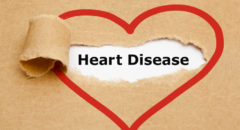 Coronary artery disease can come with a number of symptoms that often get overlooked. As one of the greatest risk factors amongst Blacks with high blood pressure, diabetes, and obesity, coronary artery disease is what leads to a heart attack.
Coronary artery disease can come with a number of symptoms that often get overlooked. As one of the greatest risk factors amongst Blacks with high blood pressure, diabetes, and obesity, coronary artery disease is what leads to a heart attack.
So, how can you keep an eye out for its symptoms? Can you catch and prevent it early? According to Mayo Clinic, here are 3 red flags to look out for:
Angina
Angina or chest pain is one of the most common symptoms. If you feel pressure or a squeezing in your chest, it may be angina. It can feel like a heart attack, but often it's a warning sign. This chest pain is happening because there isn't enough blood flowing to part of your heart.
It's a symptom of heart disease, and it occurs whensomething blocks the arteries or there's not enough blood flowing to the arteries. Although angina usually goes away rapidly, it can still be life-threatening.
Angina is described as feeling like:
- Heaviness
- Pressure
- Aching
- Burning
- Numbness
- Fullness
- Squeezing
- Painful feeling
It can also be mistaken for indigestion or heartburn and is most often experienced in the shoulder, arms, neck, back and/or jaw.
Myocardial Ischemia
Myocardial ischemia, also called cardiac ischemia, occurs when blood flow to your heart is reduced, preventing it from receiving enough oxygen. The reduced blood flow is usually the result of a partial or complete blockage of your heart's coronary arteries, reducing its ability to pump efficiently.
A sudden, severe blockage of a coronary artery can lead to a heart attack.
This can happen most during:
- Exercise or other exertion
- Eating
- Excitement or stress
- Exposure to cold
It’s also important to note that although it is more common in people with diabetes, myocardial ischemia can happen without warning in anyone with heart disease. Coronary artery disease can happen even when you’re at rest and may lead to a heart attack.
Other symptoms that can occur with coronary artery disease include:
When it comes to women, we all know that things function quite differently. Symptoms of coronary artery disease are often much subtler in women.
They may experience the following instead:
- Shortness of breath
- Palpitations (irregular heartbeats, skipped beats, or a "flip-flop" feeling in your chest)
- A faster heartbeat
- Weakness or dizziness
- Nausea
- Sweating
Are you suffering from any of the symptoms listed above? Consult with your doctor and find out more about coronary artery disease and its effects on our Health Conditions tab on BlackDoctor.org.








